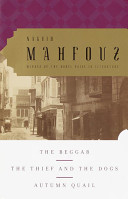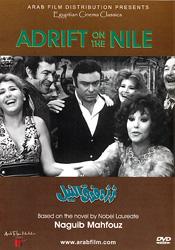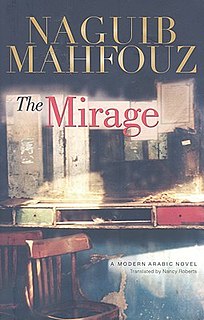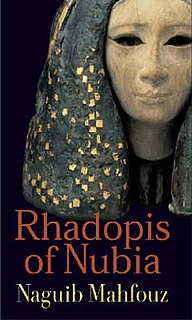 W
WAkhenaten, Dweller in Truth is a novel written and published by Nobel Prize-winning Egyptian author Naguib Mahfouz in 1985. It was translated from Arabic into English in 1998 by Tagreid Abu-Hassabo. The form and subject of the book is the basis for a cello concerto of the same title by Mohammed Fairouz.
 W
WArabian Nights and Days (1979) is a novel by Egyptian writer Naguib Mahfouz, winner of the Nobel Prize for Literature. The novel serves as a sequel and companion piece for One Thousand and One Nights and includes many of the same characters that appeared in the original work such as Shahryar, Scheherazade, and Aladdin.
 W
WThe Beggar is a 1965 novella by Naguib Mahfouz about the failure to find meaning in existence. It is set in post-revolutionary Cairo during the time of Gamal Abdel Nasser.
 W
WChildren of Gebelawi, is a novel by the Egyptian writer and Nobel laureate Naguib Mahfouz. It is also known by its Egyptian dialectal transliteration, Awlad Haretna, formal Arabic transliteration, Awlaadu Haaratena and by the alternative translated transliteral Arabic title of Children of Our Alley.
 W
WChitchat on the Nile is a 1971 film based on the novel by Egyptian Nobel Laureate Naguib Mahfouz.
 W
WThe Day the Leader was Killed is a novel written and published by Nobel Prize-winning author Naguib Mahfouz in 1983.
 W
WThe Harafish is a 1977 novel written by Naguib Mahfouz. It comprises a series of episodes in a dozen generations of a family from the Egyptian urban rabble. Many of the members of this family become clan chiefs in an alley in the city; some of them are benefactors to the other members of the harafish; some are more corrupt. Neither the location within Egypt nor the time of the events is ever identified.
 W
WThe Journey of Ibn Fattouma is an intermittently provocative fable written and published by Nobel Prize-winning author Naguib Mahfouz in 1983. It was translated from Arabic into English in 1992 by Denys Johnson-Davies and published by Doubleday.
 W
WMidaq Alley is the English Translation of 'Zuqaq El Midaq' by Egypt's Naguib Mahfouz, released in English in 1966. The story is about Midaq Alley in Khan el-Khalili, a teeming back street in Cairo which is a microcosm of the world.
 W
WThe Mirage is a 1948 Egyptian novel by Naguib Mahfouz. The novel was filmed as al-Sarab by Anwar al-Shinawi. Mahfouz has said that it is a personal novel based on his upbringing.
 W
WPalace Walk is a novel by Egyptian writer Naguib Mahfouz, and the first installment of Mahfouz's Cairo Trilogy. Originally published in 1956 with the title Bayn al-qasrayn, the book was translated into English in 1990. The setting of the novel is Cairo during and just after World War I.
 W
WRhadopis of Nubia is an early novel by the Egyptian writer Naguib Mahfouz. It was originally published in Arabic in 1943. An English translation by Anthony Calderbank appeared in 2003 published by American University in Cairo Press. The novel is one of several that Mahfouz wrote at the beginning of his career, with Pharaonic Egypt as their setting. Others in this series of novels include Khufu's Wisdom (1939) and Thebes at War (1944). All have been translated into English and appeared in one volume under the title Three Novels of Ancient Egypt.
 W
WThebes at War is an early novel by the Egyptian writer Naguib Mahfouz. It was originally published in Arabic in 1944. An English translation by Humphrey Davies appeared in 2003. The novel is one of several that Mahfouz wrote at the beginning of his career, with Pharaonic Egypt as their setting. Others in this series of novels include Khufu's Wisdom (1939) and Rhadopis of Nubia (1943). All have been translated into English and appeared in one volume under the title Three Novels of Ancient Egypt.
 W
WWedding Song also known as joys of the dome is a 1981 Arabic-language novel by Naguib Mahfouz. In the novel a narrator tells and retells the story of a marriage, each time from different character's perspective. In Naguib Mahfouz's 1981 novel Wedding Song, the narrator tells and retells the story of a marriage from the very different perspectives of the main characters, deepening the reader's understanding of “what happened in the end we read the true story by the main narrator ." In ramadan of 2016 there were an Egyptian TV series with same name.
 W
WZaabalawi is a symbolic story written by the Egyptian writer Naguib Mahfouz, winner of the Nobel Prize in Literature in 1988. It was first published in 1961 and reprinted within the collection of God's World. in 1972. Issues affecting restrictions and customs and sometimes rebellion against controls, which causes writers and philosophers in general many troubles. Some of Mahfouz's writing were influenced by philosophical literature which allowed him to raise some questions about the social and traditional restrictions and sometimes it rebel on the regulations, and that causes many troubles to the authors and to the philosophers generally. Mahfouz was speaking about his late schooling and he said, speaking of his late schooling.. "The relationship between me and Sheikh Ajaj was very friendly. He was a fan of my writing style, He also considered my construction topics as role models for students." In this period, my view of religion was characterized by some emancipation, but I emphasize that it was a liberal view and not an infidel. For example, I was writing a topic about the great people of history and I put Muhammad among them. Sheikh Ajaj considered this offensive to the prophet." Zaabalawi contains a Sufi theme, Mahfouz mentions that he is interested in the Sufi ideas by saying: "When I set to myself a program of self-education at the beginning of my life, a large part of this program was about studying major religions and the history of civilization, and I was interested in the Sufi and Islamic writings. Although I do not believe in the ideas and beliefs of Sufism as the Sufis believe, I found in reading their books and contemplated great mental and psychological comfort. In Sufism I was attracted by the idea of spiritual supremacy.”